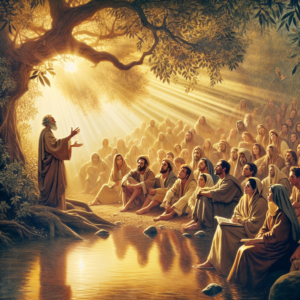Spiritual Devotional about Rituals of Passage
Spiritual Reflection: Rituals of Passage
In numerous cultures around the world, rituals mark the transition from one stage of life into the next. These rites of passage present an invaluable opportunity to reflect on God’s hand in our path, facilitating an environment to appreciate His divine guidance and love throughout our lives.
The Bible reverberates this spiritual truth beautifully, providing examples of significant rites of passage. Baptism, for instance, is a biblically noted ceremony marking the transition into a life dedicated to God. Jesus, Himself, underwent this ritual as stated in Matthew 3:13-17. A ritual like communion, as illustrated in 1 Corinthians 11:23-26, reminds us of the selfless sacrifice of Jesus Christ, suggesting a continuous passage into spiritual growth and maturation.
Baptism: A Holy Transition
Baptism holds a special place within Christian faith, signifying a public declaration of our faith and commitment to Christ. It is a symbolic rite of passage that invites us into a deeper relationship with God. As every droplet of water falls off during baptism, it symbolizes the washing away of our sins, marking a new chapter filled with God’s love and grace.
The Holy Communion: A Spiritual Journey
The celebration of the Holy Communion is another profound religious ritual that signifies our continuous passage on the spiritual path. Through partaking of the bread and the wine, we remember Christ’s sacrifice and celebrate the new covenant, marking our ongoing journey of faith and spiritual growth.
Rites of Passage: Celebrating Milestones with God
In these rituals, we acknowledge the divine’s presence, celebrating each milestone under His watchful gaze. These rituals of passage act as sanctified pauses, creating spaces for gratitude and reflection, reminding us of God’s eternal love, and inspiring us to walk the path He has laid out for us with renewed faith and commitment.
As life perpetually moves forward, let us embrace each of these stages as passages to celebrate, honor, and affirm our faith. Extract meaning from them, appreciate the divinely appointed transitions, and continue to grow in our spiritual journey. For in every step, God is with us. And as stated in Jeremiah 29:11, “For I know the plans I have for you,” declares the LORD, “plans to prosper you and not to harm you, plans to give you hope and a future.”
May every rite of passage you experience in life bring you closer to Him, deepen your faith, and fill your life with abundant joy and peace. Amen.
Explore and dig up answers yourself with our BGodInspired Bible Tools! Be careful – each interaction is like a new treasure hunt… you can get lost for hours 🙂
Q&A about Rituals of Passage
Q: What are Rituals of Passage?
A: Rituals of Passage, also known as Rites of Passage, are ceremonies or events marking important milestones in a person’s life, such as birth, puberty, marriage, having children and death. They often involve celebratory, cultural or religious practices.
Q: What is the purpose of Rituals of Passage?
A: Their purpose is to anchor significant stages of an individual’s life in their community and society. They provide social recognition, validation, support and often come with new roles and responsibilities.
Q: Can you provide examples of Rituals of Passage from different cultures?
A: Yes, examples include bar/bat mitzvahs in Jewish tradition, baptism and confirmation in Christian tradition, samskaras in Hindu tradition, seijin shiki (coming of age) in Japan, and vision quests in some Indigenous cultures.
Q: Are Rituals of Passage always religious in nature?
A: No, they are not always religious in nature. Some Rituals of Passage can be cultural, societal, or personal. Examples include graduation ceremonies, engagement parties, or retirement parties.
Q: How do Rituals of Passage impact an individual’s identity?
A: Rituals of Passage play a crucial role in the formation of an individual’s identity by providing a sense of belonging and acceptance within their community or society. They also mark transitions in a person’s life, symbolizing personal growth and transformation.
Q: Do all cultures have Rituals of Passage?
A: Yes, almost all cultures have Rituals of Passage, but they may vary significantly in terms of practices, symbolism and significance. Depending on different societal norms, traditions and beliefs, the way they mark key life milestones can be unique.
Q: Can Rituals of Passage be adapted or modified?
A: Yes, while some Rituals of Passage are deeply rooted in tradition, they can be adapted or modified to accommodate individual beliefs, preferences, and societal changes, provided that these modifications are accepted within the individual’s community or society.


